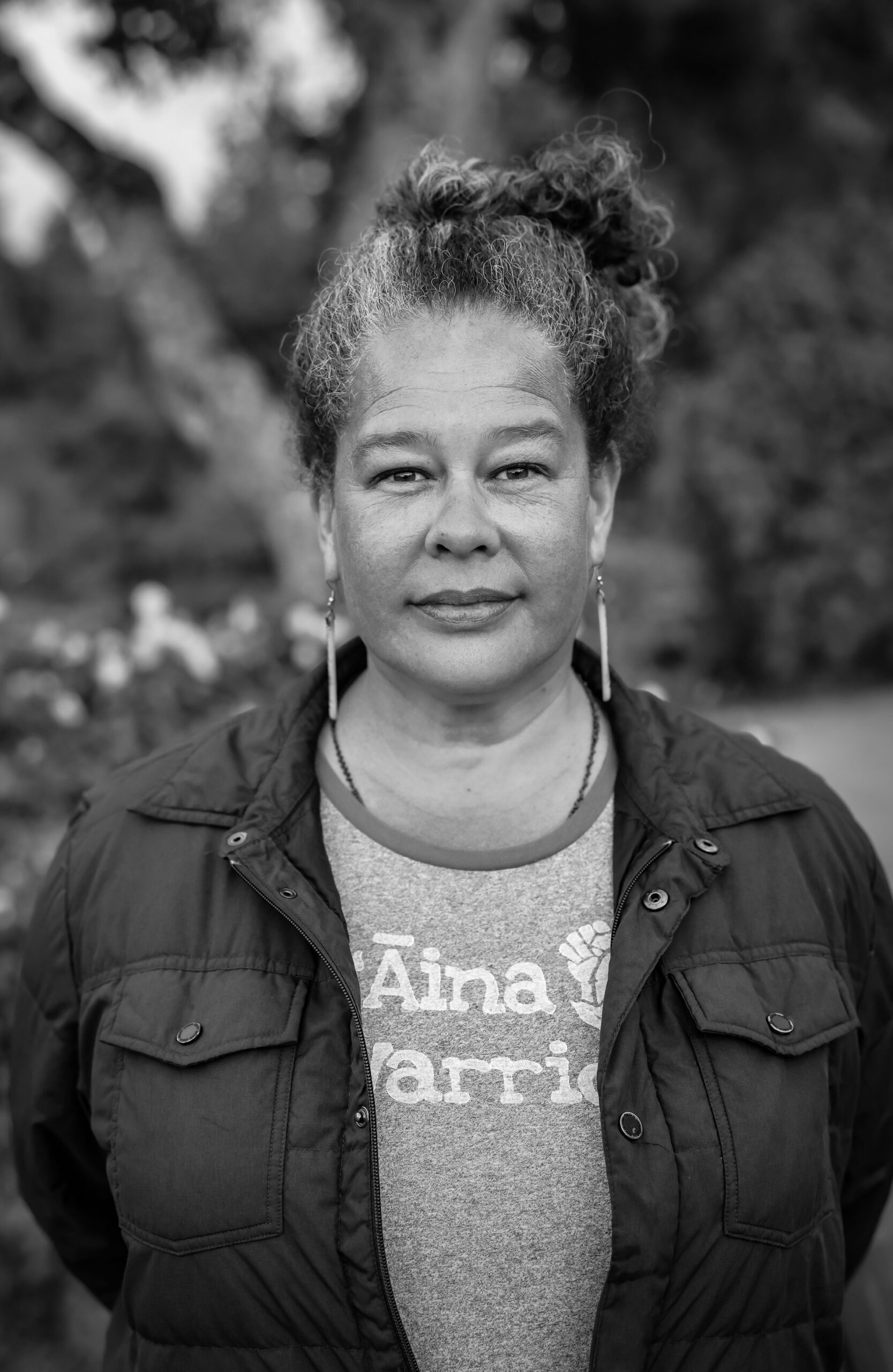Earlier this year, we sat down with Micky Huihui, Executive Director of Hawai’i People’s Fund (HPF), an organization that exists to specifically address the needs of grassroots progressive movement building in Hawai’i. Established in 1972, they are a model for progressive social change and participatory, activist-advised grantmaking.
Micky is the first Native Hawaiian ED at HPF, one of our We Got Us Fund grantee partners since 2021. With over 20 years of experience and expertise in community engagement, Micky is also a member of our We Got Us Fund Community Advisory Committee (CAC), a group of grassroots community leaders and directly impacted leaders who share strategies and recommendations as part of our grantmaking process. We are grateful to be in community and partnership with HPF, and are especially grateful to Micky for sharing her passion and insight with us. Here are some excerpts from our inspiring conversation:
NBF: What is the mission of HPF? What kind of organizations do you fund?
Micky: HPF’s mission is to support, fund, and amplify Hawai’i-based grassroots organizations that are challenging systems of oppression. To put it bluntly, if a group of folks is being harmed because of systemic oppression, and if there is a group of folks within that community that’s organizing to address the root causes of that inequity, that is who we fund. We are intersectional grantmakers, recognizing that oppression is systemic and touches every part of our lives. We fund particular issue areas, including education and language reclamation, demilitarization in Hawai’i, environmental justice, preservation of indigenous lifeways, youth organizing, and many other issues. Last year, we funded 33 organizations, the most funded grantees we’ve had in a single year.
At HPF, we strive to be a model for progressive philanthropy here in Hawai’i. Things tend to be top-down in traditional philanthropy; the roots-up approach is what we’ve been doing since 1972. Our motto is “change, not charity” – not that there is anything wrong with charity, but it’s just not what we fund. We support folks who are trying to actually CHANGE the systems that harm.
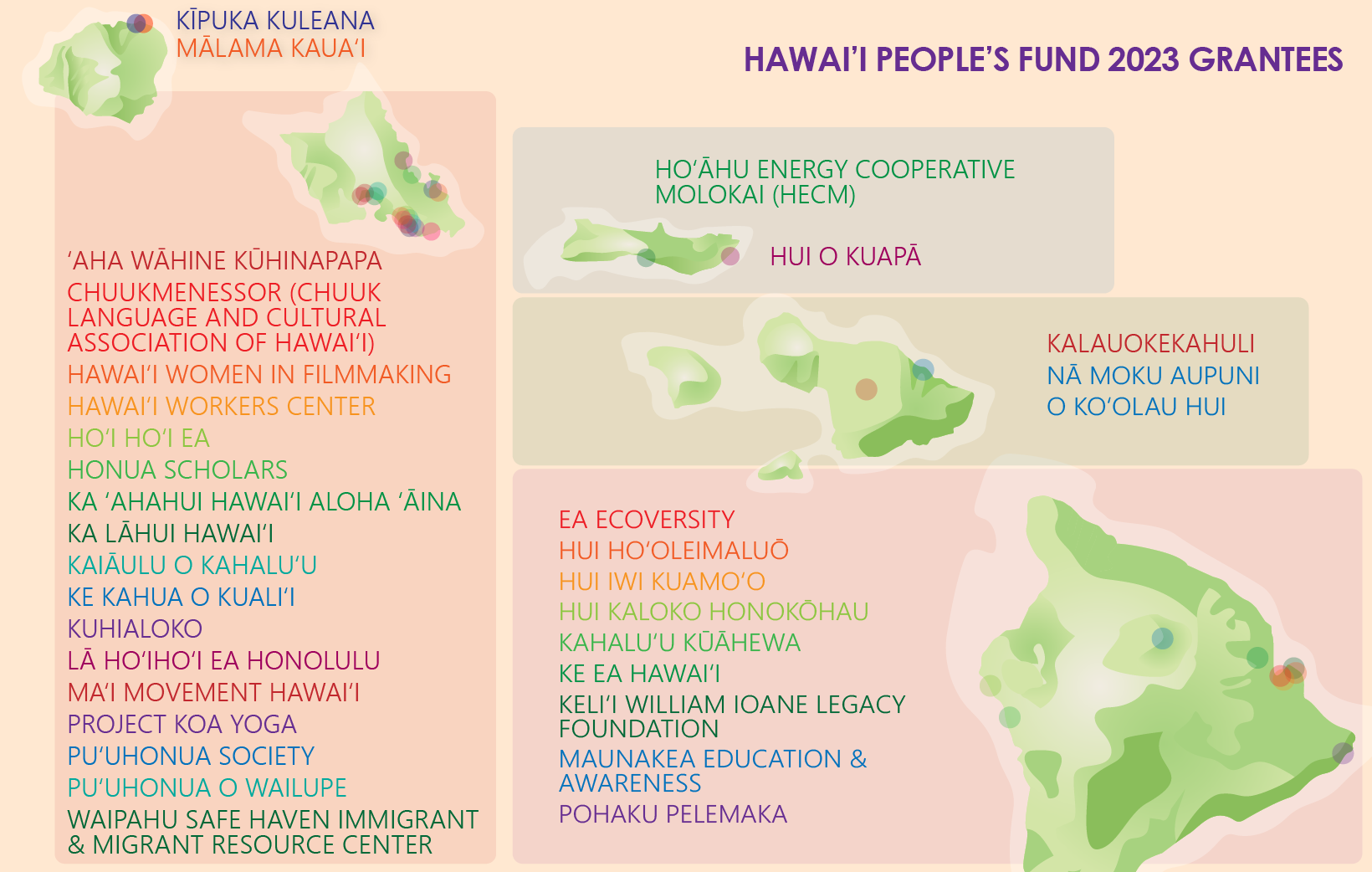
NBF: Can you tell us about some of the shifts that have been happening at HPF since you became the ED?
Micky: Historically, the “fund” part in our mission statement has been very lean. HPF successfully awarded grants, though we only had enough resources to support small grants for a small number of grantees. We know from grassroots organizing work that even a little bit of resources can go a long way. My primary focus has been to ramp that up and also to diversify HOW we support our community.
For the past few years, we’ve been able to innovate to achieve our mission of moving money to movements. There weren’t a lot of current collateral materials about HPF, and we had a very limited social media presence. Especially during COVID, we leaned in to supporting and amplifying the work of our grantees – and in a very natural way, that fed into the funding part. We got the word out about who we were and, most importantly, who we served. And ramping up that amplification piece was critical. Supporting and amplifying leads to funding, whereas before, it felt like this constant hustle to raise money.
NBF: During COVID, many philanthropic organizations, including HPF, experienced a lot of growth. Can you share how your organization navigated that period and your philosophy toward financial growth?
Micky: During COVID, there was a shift in philanthropy when all of these glaring holes in the systems were becoming obvious to everybody, and then all of this abundance started pouring in because people wanted to do something about it. And suddenly, we’re sitting with this massive budget and wondering, what do we do with it? The only thing that we could do with that abundance was to get it out the door and get it into the community and not embody what we’re trying to defeat in philanthropy – which is hoarding wealth, saving it for a rainy day, and all this stuff that is counter to why we were established in the first place.
The environmental activist Edward Abbey once said, “Growth for the sake of growth is the ideology of the cancer cell.” Exponential growth is not OK. Our #1 priority is our community, and that’s the only reason we exist – to feed the movement and be a connector in some way. We must stay laser-focused no matter if our budget is $100,000 or a million dollars – 80% or more of that needs to go out the door. We can’t just sit on it.
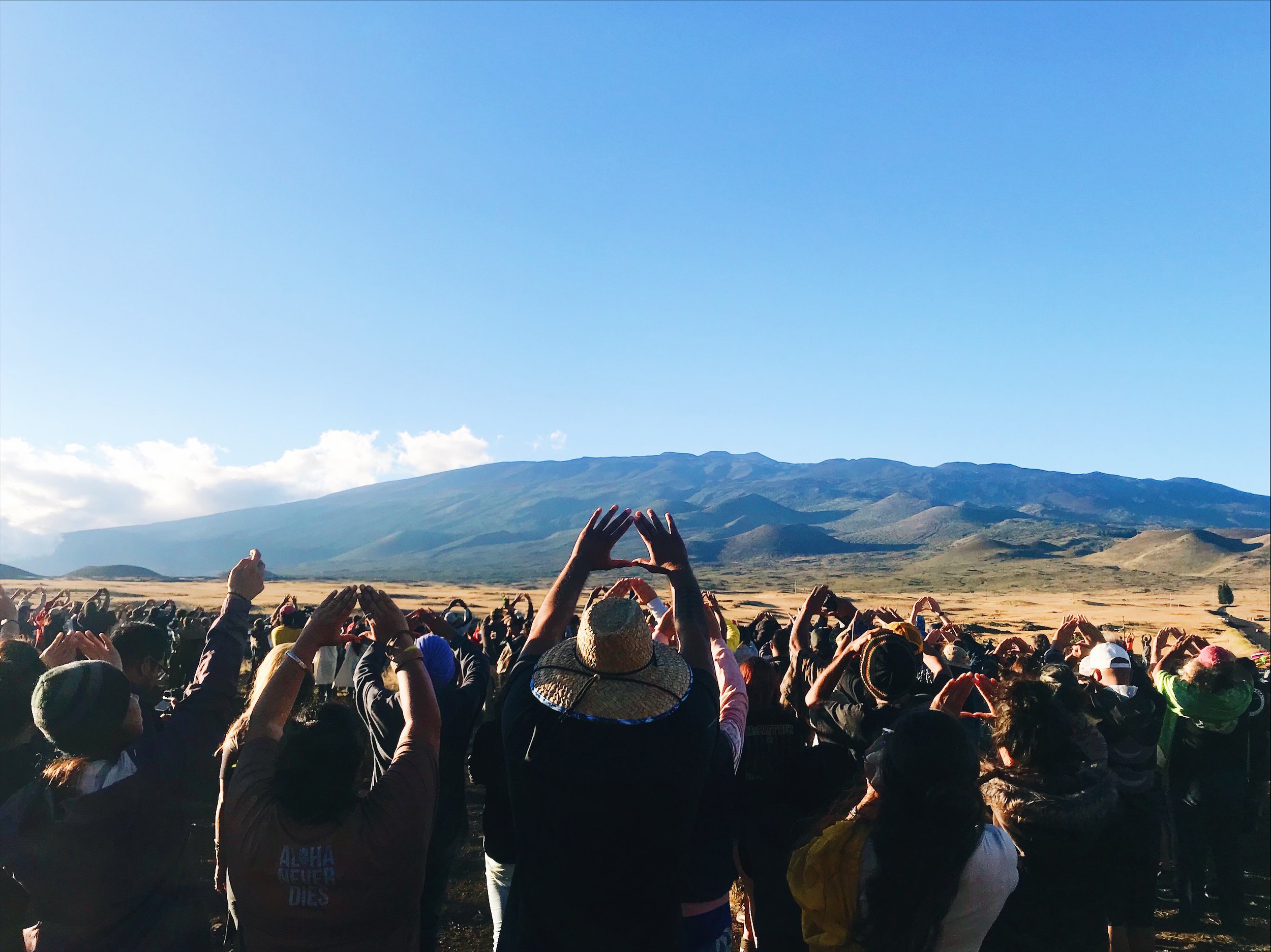
NBF: You mentioned that you see HPF’s role as being a connector. Can you tell us more about your role as connectors in the grantmaking process?
Micky: Primarily, we connect activists and donors who want to confidently invest in grassroots organizing on the ground. We do make grants as well, but primarily we connect our community partners with each other, with the larger community, and with other funders that have way more resources than we do to support their work.
Our primary work is connecting funded grantees to the folks we know. Our secondary work is to connect non-funded grantees to organizations that would fund them. Many applicants are seeking social service support vs. social change. And while we don’t fund social service, we are connected to lots of organizations that do. So we refer those folks to other organizations, and many times, we are able to make that connection. Last year, we moved $510,000 in grantmaking, which is more than we’ve ever moved before. But we also moved over $600,000 of not our money. Whether or not the funding is coming through HPF, we’re spreading awareness and advocacy and making important connections. And even though it’s not on our taxes or recorded anywhere, it gives us a sense of truly being in community because, at the end of the day, we’re not trying to build a massive cohort of grantees. We’re building movement.
As grantmakers, we have kuleana. The word kuleana in the Hawaiian language carries many profound meanings, invoking ideals of reciprocity, jurisdiction, and accountability. The most common definition of kuleana is responsibility coupled with the awareness of the privilege to carry it. The pinnacle Hawaiian value of mālama ʻāina, caring for the land, perfectly illustrates kuleana – the privilege of being blessed with land that provides abundance and life insists on the unwavering commitment to take responsibility for its care.
Kuleana can provide amazing clarity about what begins and ends with us as individuals, leading to empowerment, ownership, and personal transformation. Solidarity is kuleana we all share – a privilege and a responsibility to effect positive change in the communities we touch in whatever way we can. It’s a privilege to be a part of Hawai’i’s social change ecosystem, and as resource organizers, we are responsible for making those connections.
NBF: Is there a particular project that you are working on now that you are excited about?
Micky: HPF is part of the Giving Project Network, and we launched our own program in 2021. The Giving Project is getting us closer to expanding into uncharted networks and moving beyond our movement-building bubble. For five months, a cohort of about 20 people come together to engage in deep political education and relationship building and to radically transform the way they move money to movements. We learn together about grassroots organizing happening in Hawai’i, and how our community partners are challenging systems of oppression like racism, classism, traditional philanthropy, and so on. We build pilina – connection and relationship – among cohort members with our community partners and their important work. Then they go out and spread the good news to their own communities. The GP23 “super advocates,” most of whom were previously unconnected to HPF before the program began, just collectively moved over $144,000 to movement work in Hawai’i through their amplification and “fund-shifting” efforts!
We have a hugely cross-class cohort this year. If folks from all class backgrounds are sitting at their dinner tables, sharing about social change work, imagine the impact that can have, across race, across class. It’s going to take LOTS of people involved in movement work to really make a difference, and we believe we can change Hawai’i this way. We believe we can change the world this way.
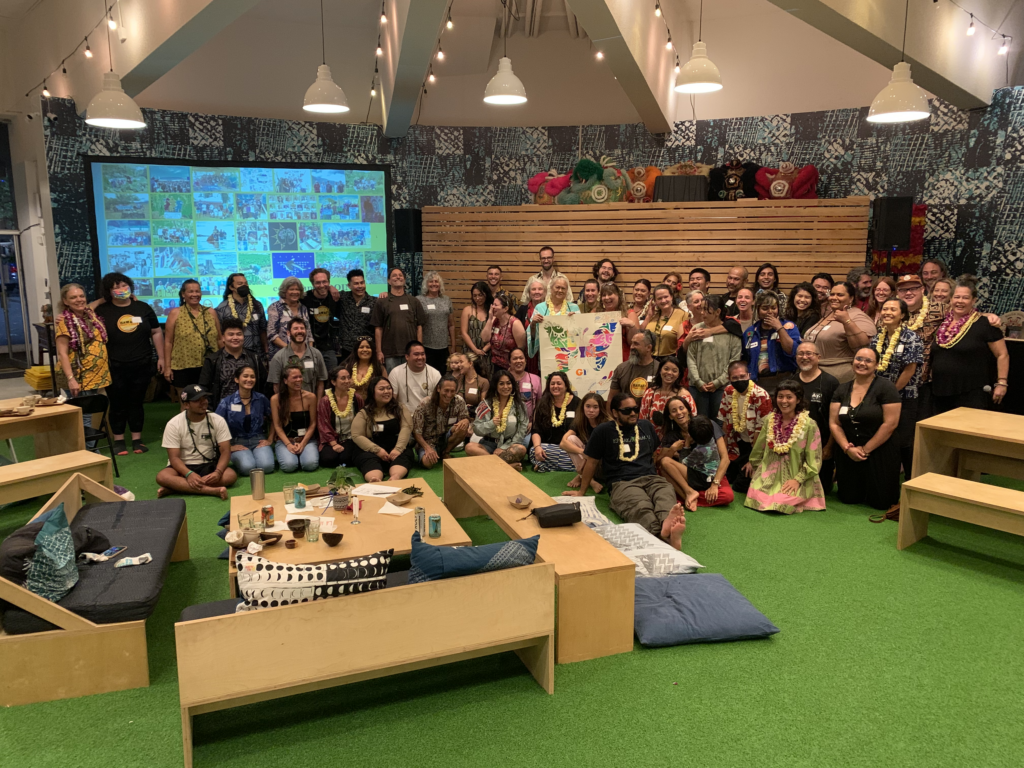
NBF: New Breath Foundation and Hawai’i People’s Fund are similar in that we are participatory grantmaking institutions that regrant funds to other community organizations. What has your experience been as an NBF grantee partner and a member of our CAC?
Micky: We love being in community with NBF. We’ve never felt so incredibly supported as a grantee partner. Typically in philanthropy, the attitude is, “Here’s a check, good luck.” While that has often been the vibe of us receiving grants, that’s not how we care for our community partners. Eliminating that power dynamic between grantee and funder is something we constantly focus on in our grantmaking and engagement. Once the grantmakers make the grants, we meet with every single partner. This is not a top-down relationship. This is an all-of-us-in-the-same-boat-trying-to-change-the-world relationship. That’s what’s different about what we do as a funder in Hawai’i, and I feel NBF is the same way.
We pride ourselves on our activist-led grantmaking. People often ask, what does “activist-led grantmaking” mean? It means that the folks making the funding decisions are directly connected to the oppressions we’re trying to solve – very much like the Community Advisory Committee (CAC) at NBF. Just as we want to set an example as progressive funders in Hawai’i, we see NBF setting a similar example in the Bay Area and the continent, empowering impacted AANHPI folks with lived experience to be leaders in organizations. We’re super grateful and thankful to be in community with other grantmakers who are trying to change the world as opposed to just putting bandaids on it. I think that is how NBF and HPF are similar to each other, and different from the rest of the philanthropy world.
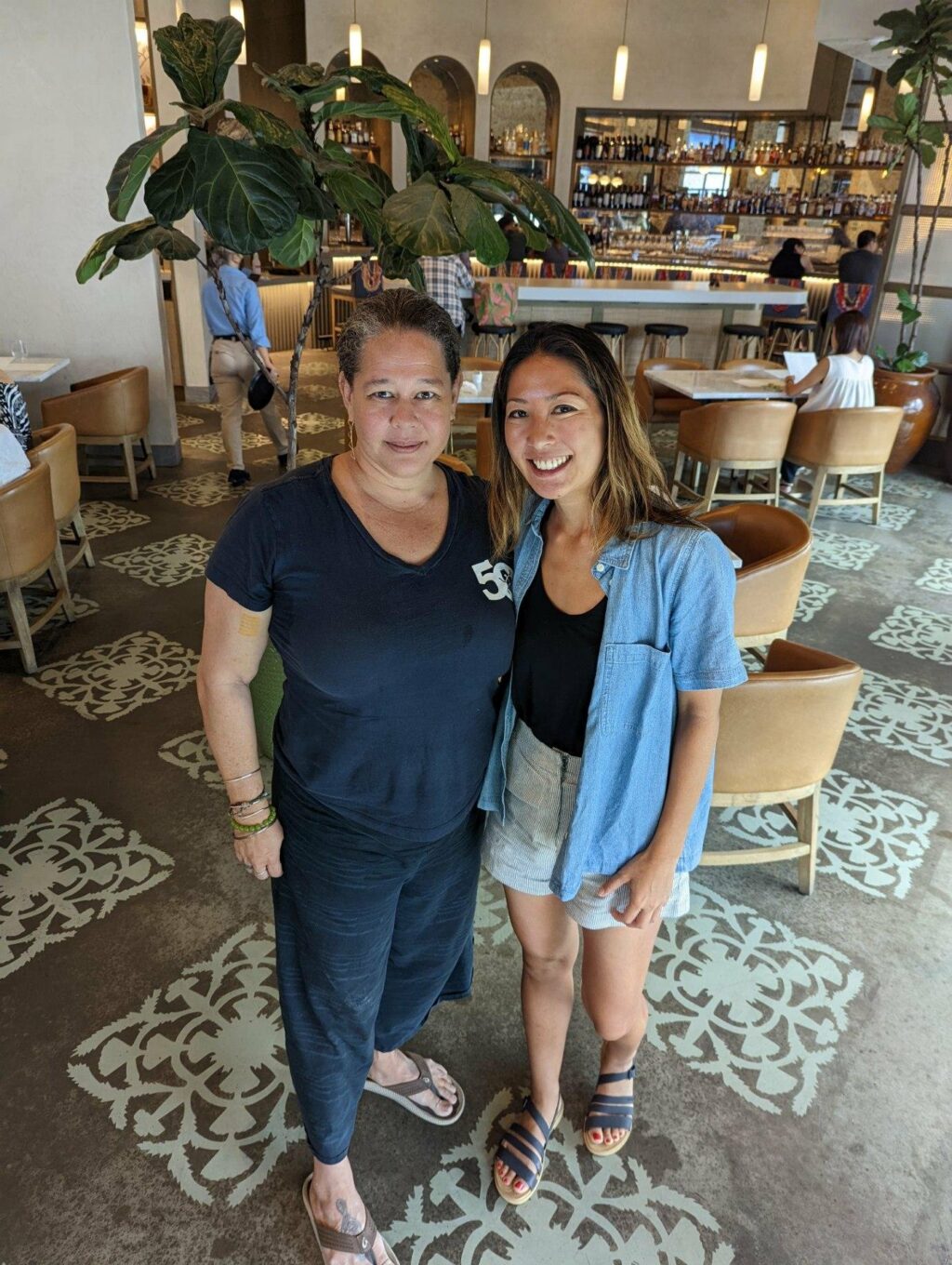
NBF: What advice do you have for folks on the continent looking to support your work?
Micky: Check out our website! Check out the Hawai’i Rising podcast! We always lead with highlighting the awesome impact our community partners make every day. And please REACH IN ANY TIME! If there is something that folks read in this blog post that resonates, we invite them to reach in and connect with us directly at [email protected].
Finally, assuming most of your blog readers are on the continent, I would be remiss if I didn’t mention that there’s a forecast for 10 million tourists to visit Hawai’i by the end of this year. Hawai’i is in the middle of a water crisis after our sole source aquifer was poisoned by a jet fuel leak by the u.s. Navy; many in our community are being priced out and moving away; the carrying capacity of our homeland is stretched to its limits. There’s a high chance that your readers will visit Hawai’i and participate in extractive tourism. And there’s a high probability that many people getting off a plane here are connected in some way or feel passionate about one of the issue areas that our community partners are addressing – traditional birthing practices, environmental justice, reproductive justice, indigenous rights, workers’ rights. If your readers are planning on participating in tourism this year, we invite folks to reach in to HPF before getting here. We can help connect them to the people working hard every day for a better Hawai’i and help facilitate a non-extractive experience. We are happy to be a connector in this way.
To learn more about Hawai’i People’s Fund, visit www.hawaiipeoplesfund.org.
About Micky Huihui, in her own words:
I come from the East side of Oʻahu Island; my ancestors hail from Maui, Kauaʻi, and Niʻihau. I am descended from the indigenous people of this land.
A community engagement lady by trade, I have been blessed to serve as an organizer in the larger movement for independence and self determination in my community in various capacities. I jumped into the hot seat at Hawai’i Peopleʻs Fund in 2016 as the Executive Director, and soon found inherent parallels between community organizing and moving resources to movements here at home, across issue areas.
I firmly believe that social justice in Hawai’i begins with indigenous justice. In these weird huli days full of uncertainty, I feel so fortunate to be in service to the larger transformation of my beloved Hawai’i. This work has me believing that WE WILL WIN – ALL of us – in our collective efforts for liberation, solidarity, and justice. I love music, the ocean, my ʻohana (blood and chosen), and the moon.
